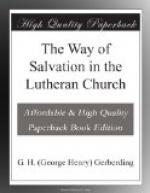We notice, first, that not all conversions are alike clearly marked. Some are more strongly marked than others. There are greater and less degrees of intensity in the change. The degree of intensity, or depth of experience, may depend on several things. It may depend, to, a certain extent, on the temperament of the individual. One person is of a phlegmatic temperament; his mind is sluggish; his feelings are not deep; he rarely becomes excited. Of a cool, calculating disposition, he does everything deliberately and cautiously. He feels the ground before him ere he takes a step. When God’s Word comes to such an one, it does not generally revolutionize him at once. He hears it, carries it home, weighs it, ponders it, and wants to hear more. Gradually, slowly, his mind is enlightened, his heart is interested, his will is changed. In him the Word is likely to grow as a seed, or operate like leaven in meal. There is seldom much excitement, and little outward manifestation.
Another is of a sanguine temperament; he is impulsive, easily aroused, and ready to jump at conclusions. When God’s Word comes to him, and is not opposed, it is more likely to take strong hold of him. It may so alarm him, and take away his peace, that he may at once see the depth of his guilt. Again, when Christ, His atonement and love for guilty men, are presented, he may quickly lay hold of the hope set before him in the Gospel, and rest on Christ. God’s Word comes to him like a hammer that breaks the stony heart. Both persons have been led by the same Spirit, through the same Word. Both have repented and believed, but each in his own way.
The degree of intensity may also depend on the former life of the person.
One has wandered very far from his Father’s house. He has wasted his substance in riotous living. He has sunken very low in sin and guilt. When God’s Word comes to such an one, and shows him his wretched state, when he comes to himself, his penitence is likely to be deep and painful, and when he is enabled to believe, his faith will probably be quite joyful, because he realizes the depth from which he was drawn. God’s Word has acted on him like a fire, burning deep down into the conscience, consuming its dross.
Another has never wandered so far away. He has all along been more or less under divine influence. Baptized in childhood, brought up amid Christian restraints, he has at least observed the outward obligations of religion, though he may not in the past have yielded himself unreservedly unto Christ. When such an one does give himself to God, his repentance may not be so marked, or his faith be so demonstrative, but on this account the conversion is none the less real. God’s Word, at length, opened his heart, as the heart of Lydia, the seller of purple, was opened.




